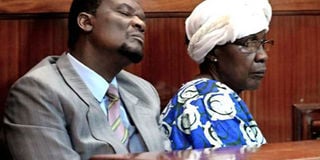Two South Africa witnesses could have nailed Waluke and Wakhungu

Sirisia MP John Waluke and business partner Grace Sarapy Wakhungu in a Nairobi court on January 29 during the hearing of a case in which they are charged with fraudulently receiving over Sh300 million from the NCPB. PHOTO| DENNIS ONSONGO | NATION MEDIA GROUP
What you need to know:
- Mr Freddy Chetty from Durban, South Africa, testified that he was a director of Chelsea Freight with two other co-directors Thilogan Pillay and Leon Alfred Maynard.
- His evidence is that the invoice touching on the maize matter did not emanate from their company.
- The prosecution also called Mr Andries Christoffel, a police officer from South Africa who said he got a court order to investigate the companies.
- He said he physically looked for the individuals of the companies named. The officer said some of the people named by Erad as business associates denied knowing the company and having any dealings with it.
As Sirisia MP John Koyi Waluke and his co-convict Grace Wakhungu started serving their jail term on Thursday night after they were found guilty of fraud, it is emerging that evidence by two South Africans tilted the scales in favour of the prosecution in the Sh313 million case.
The MP and Ms Wakhungu will cool their heels in prison for a while, as their lawyers prepare to file an appeal against the conviction and sentences.
Mr Danstan Omari, one of the defence lawyers, said they will file the appeal on Monday because the Milimani Law Courts were closed on Friday for fumigation.
The jailing of the second-term legislator is a major victory for the Ethics and Anti-Corruption Commission and Director of Public Prosecutions Noordin Haji in the graft war.
To support their case, the prosecution called Mr Freddy Chetty from Durban, South Africa, who testified that he was a director of Chelsea Freight with two other co-directors Thilogan Pillay and Leon Alfred Maynard.
His evidence is that the invoice touching on the maize matter did not emanate from their company. The witness said the issuance of all invoices at Chelsea was under his docket and mandate and maintained that he was not aware of an invoice tabled by Erad Supplies.
He also denied being involved in any storage businesses and that the company did not receive any money from Erad.
The prosecution also called Mr Andries Christoffel, a police officer from South Africa who said he got a court order to investigate the companies.
He said he physically looked for the individuals of the companies named. The officer said some of the people named by Erad as business associates denied knowing the company and having any dealings with it.
Mr Waluke admitted he was paid Sh50 million from the award while Ms Wakhungu got Sh40 million. Mr Jacob Juma paid himself Sh113 million while the rest was paid to law firms that represented the company in the arbitration.
And for receiving the fraudulent money, the MP and Ms Wakhungu will pay more than Sh2.1 billion.
Attempts by Mr Waluke to shift blame to his former co-director and business associate, Jacob Juma, who was killed in 2016, were dismissed by Chief magistrate Elizabeth Ongeri.
Mr Waluke said Juma was “aggressive and ran the day-to-day activities of the company. It was also he who paid them the money.
What is unknown to many Kenyans, however, is how their company, Erad Supplies and General Contractors, almost crippled the services of the National Cereals and Produce Board (NCPB) by attaching its accounts and property, as they sought to enforce an award granted to them by an arbitrator in 2009.
After obtaining the award in July 2009, the firm went for NCPB’s accounts, premises and properties, confiscated some and sold them through public auction. The award was confirmed by High Court (retired) judge Leonard Njagi in June 2011.
Other than receiving millions, the firm attached and sold NCPB’s 20 computers, water dispensers, furniture, eight motor vehicles, fork lifts, two grain dryers (indicated by auctioneers to be valued at Sh400 million) and a heavy duty diesel generator valued at Sh200 million.
All of them were sold through public auction and proceeds not accounted for.
Documents filed in court showed that NCPB desperately sought to stop the raids in vain. As if attaching the properties was not enough, Erad also made an application to attach several parcels of land belonging to NCPB in Nairobi, Kisumu, Nakuru and Eldoret.
The cases are still pending in court after EACC obtained orders stopping the sale. The firm was still seeking more from the agency.
In the case, the duo claimed they imported the maize, which was meant for the strategic grain reserve, from Ethiopia. And before arriving in Ethiopia, the maize had been stored in South Africa, making them incur more losses.
NCPB lawyers including Katwa Kigen, Paul Gicheru and Joshua Nyawara later pleaded with the Court of Appeal to stop further attachment as it challenged the award by veteran advocate Evans Thiga Gaturu.
They argued the potential sale of NCPB stores, which facilitate the purchase and storage of subsidised fertilisers and grain, was likely to cripple the agency’s core mandate and trigger a national disaster.
The lawyers said the move was likely to adversely affect relief food supplies and paralyse food security and endanger national security.
But the company pressed on as it maintained that the award was lawful.





